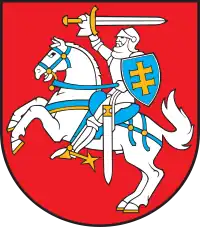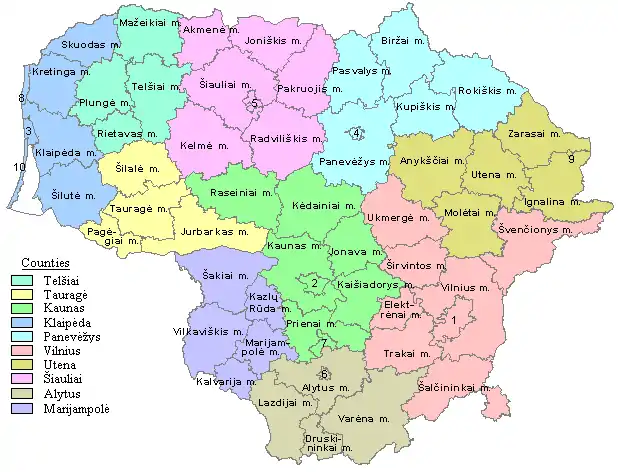 |
|---|
 Contour map of Lithuania indicating modern counties |
| Administrative divisions of Lithuania |
|---|
|
Counties Municipalities Elderships Sub-elderships |
| Geocodes of Lithuania |
|
|
The territory of Lithuania is divided into 10 counties (Lithuanian: singular apskritis, plural apskritys), all named after their capitals. The counties are divided into 60 municipalities (Lithuanian: singular savivaldybė, plural savivaldybės): 9 city municipalities, 43 district municipalities and 8 municipalities. Each municipality is then divided into elderates (Lithuanian: singular seniūnija, plural seniūnijos). This division was created in 1994 and slightly modified in 2000.
Until 2010, the counties were administered by county governors (Lithuanian: singular – apskrities viršininkas, plural – apskrities viršininkai) appointed by the central government in Vilnius. Their primary duty was to ensure that the municipalities obey the laws and the Constitution of Lithuania. They did not have great powers vested in them, and so it was suggested that 10 counties are too much for Lithuania as the two smallest counties administer only four municipalities. Therefore, on 1 July 2010, the county administrations were abolished, but the counties themselves are retained for statistical and reporting purposes.[1]
Modern apskritys should not be confused with apskritys that existed in the independent Lithuania during the interwar period. At that time Lithuania had a two-tier administrative division: apskritys that were subdivided into valsčius. Lithuania now has a three-step division: counties, municipalities, and elderates (apskritys, savivaldybės, and seniūnijos). See subdivisions of Lithuania for details.
Map
This map shows counties as well as municipalities. Eight city municipalities and two municipalities are marked by numbers:

List
| # | County (media help) | Capital | Area in km2 (rank) | Population (2023)[2] | Pop. density (per km2) | GDP (nominal) (billion EUR)[3] | GDP (per capita) (EUR) | Average monthly gross salary (EUR)[4] | HDI (2021) [5] | Municipalities |
|---|---|---|---|---|---|---|---|---|---|---|
| 1 | Alytus County (listen • info) |
Alytus | 5,418 (6) | 135,367 | 25 | 1.6 | 11,500 | 1,582 | 0.841 | |
| 2 | Kaunas County (listen • info) |
Kaunas | 8,086 (3) | 580,333 | 70 | 11.6 | 20,400 | 1,930 | 0.882 | |
| 3 | Klaipėda County (listen • info) |
Klaipėda | 5,222 (7) | 336,104 | 61 | 6.0 | 18,400 | 1,802 | 0.876 | |
| 4 | Marijampolė County (listen • info) |
Marijampolė | 4,466 (8) | 135,891 | 31 | 1.6 | 11,800 | 1,575 | 0.830 | |
| 5 | Panevėžys County (listen • info) |
Panevėžys | 7,878 (4) | 211,652 | 27 | 3.0 | 14,100 | 1,638 | 0.847 | |
| 6 | Šiauliai County (listen • info) |
Šiauliai | 8,537 (2) | 261,764 | 31 | 3.9 | 15,000 | 1,649 | 0.847 | |
| 7 | Tauragė County (listen • info) |
Tauragė | 4,349 (9) | 90,652 | 21 | 1.1 | 10,900 | 1,586 | 0.817 | |
| 8 | Telšiai County (listen • info) |
Telšiai | 4,350 (10) | 131,431 | 30 | 1.8 | 13,500 | 1,724 | 0.847 | |
| 9 | Utena County (listen • info) |
Utena | 7,191 (5) | 125,462 | 18 | 1.4 | 11,200 | 1,548 | 0.831 | |
| 10 | Vilnius County (listen • info) |
Vilnius | 9,730 (1) | 851,346 | 84 | 24.2 | 29,800 | 2,191 | 0.913 | |
| Lithuania | Vilnius | 65,300 | 2,860,000 | 43 | 56.2 | 20,000 | 1,960 | 0.875 |
See also
- Administrative divisions of Lithuania
- Municipalities (Lithuanian: plural – savivaldybės, singular – savivaldybė)
- Elderships (or wards) (Lithuanian: plural – seniūnijos, singular – seniūnija).
- Seniūnaitija (sub-eldership)
- Cities (Lithuanian: plural – miestai, singular – miestas)
- Towns (Lithuanian: plural – miesteliai, singular – miestelis)
References
- ↑ "Dėl apskričių viršininkų administracijų likvidavimo". Seimas of the Republic of Lithuania. Retrieved 21 August 2011.
- ↑ "Resident population at the beginning of the year".
- ↑ "BENDRASIS VIDAUS PRODUKTAS PAGAL APSKRITIS 2021 M." (in Lithuanian). Statistics Lithuania. 25 November 2016. Retrieved 22 November 2018.
- ↑ "Darbo užmokestis regionuose, apskrityse ir savivaldybėse".
- ↑ "Sub-national HDI - Area Database - Global Data Lab". hdi.globaldatalab.org. Retrieved 2018-09-13.